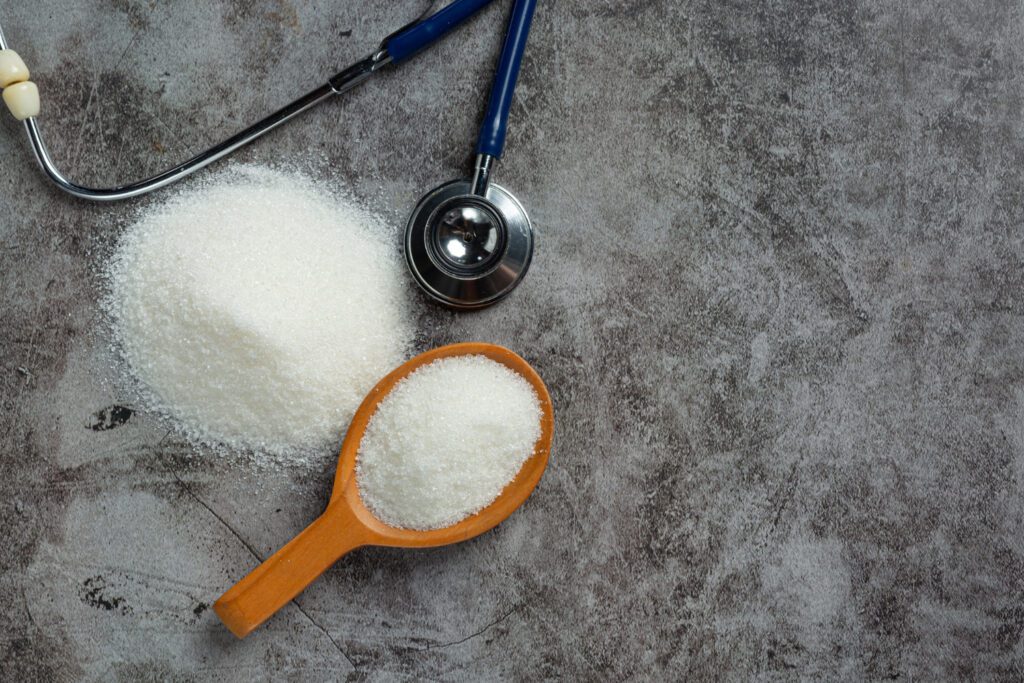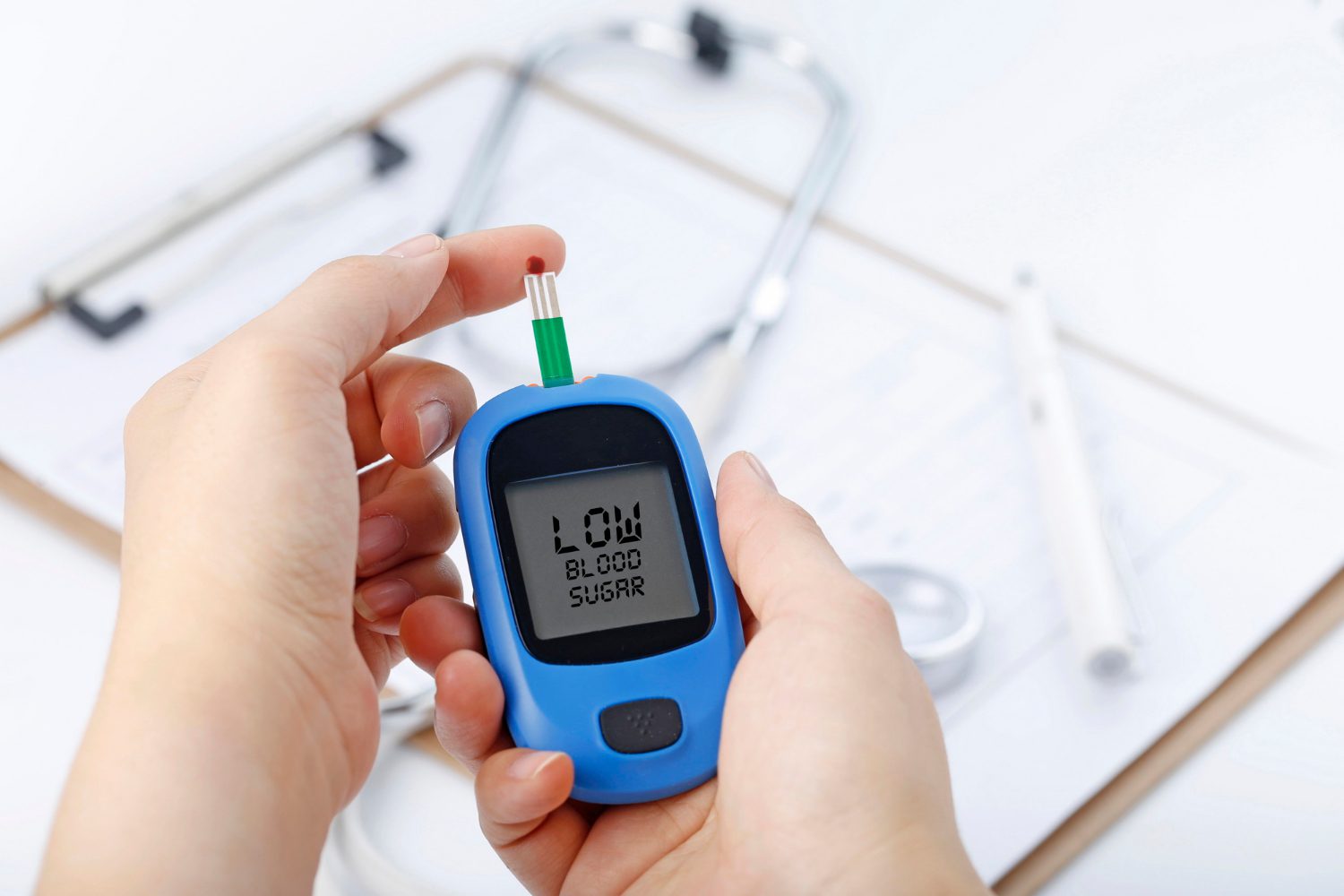Fructose does not raise blood sugar levels as significantly as other carbohydrates do. Fructose, a naturally occurring sugar found in fruits, honey, and some sweeteners, has long been considered a healthier alternative to traditional table sugar.
This is because it has a lower glycemic index and does not cause a rapid spike in blood sugar levels. However, it’s important to note that excessive fructose consumption, particularly in the form of high-fructose corn syrup found in many processed foods, can still have negative health effects and contribute to insulin resistance.
In this article, we will explore the impact of fructose on blood sugar levels and dive into the reasons behind its unique metabolic effects. So, let’s uncover the truth about fructose and its connection to blood sugar regulation.

Photo Credit: https://www.freepik.com
Understanding Fructose And Its Effects On Blood Sugar
Fructose, just like other sugars, is a commonly used sweetener found in various food and drinks. But how does it affect our blood sugar levels? In this section, we will explore the metabolism process of fructose in the body and uncover whether or not it truly raises blood sugar.
So, let’s dive in and understand fructose and its effects on blood sugar!
What Is Fructose And How Is It Different From Other Sugars?
Fructose is a natural sugar that is naturally present in fruits, honey, and some vegetables. It is also used as a sweetener in many processed foods and beverages. Unlike glucose, which is the primary sugar used by our cells for energy, fructose is metabolized differently in the body.
Here are the key points to know:
- Fructose is sweeter than glucose, which means less is required for a similar level of sweetness.
- When we consume fructose, our liver metabolizes it directly, while glucose is directly absorbed into the bloodstream.
- Fructose can only be metabolized by the liver, unlike glucose, which is used by all our body’s cells.
The Metabolism Process Of Fructose In The Body
Now that we understand how fructose differs from other sugars, let’s take a closer look at its metabolism process. Here are the main points to consider:
- When we consume fructose, our body breaks it down into glucose and other byproducts through a series of enzymatic reactions.
- Unlike glucose, fructose does not significantly raise blood sugar levels immediately after consumption.
- Instead of being used as immediate energy, fructose is converted into glycogen in the liver and stored for later use.
Does Fructose Elevate Blood Sugar Levels?
Now comes the burning question: does fructose raise blood sugar levels? Research suggests that fructose, when consumed in moderate amounts through whole fruits, does not have a significant impact on blood sugar levels. Here are the key points to remember:
- Whole fruits contain fiber, which slows down the absorption of fructose and minimizes its impact on blood sugar.
- However, excessive consumption of fructose, especially in the form of added sugars found in sodas, candies, and processed foods, can contribute to elevated blood sugar levels and other health issues.
While fructose metabolizes differently than other sugars, moderate consumption of fructose in its natural form, such as through whole fruits, is unlikely to significantly raise blood sugar levels. However, it’s essential to be mindful of added sugars in processed foods to maintain optimal blood sugar control and overall health.
The Link Between Fructose Consumption And Blood Sugar Spikes
Fructose, a type of sugar commonly found in fruits and added sugars, has been a topic of debate when it comes to its impact on blood sugar levels. Many people wonder if consuming fructose can lead to spikes in blood sugar and potentially contribute to conditions like diabetes.
In this section, we will explore the link between fructose consumption and blood sugar spikes, specifically focusing on the impact of fructose on insulin production, how it affects the liver, and its potential association with diabetes.
Exploring The Impact Of Fructose On Insulin Production
- Fructose consumption does not directly raise blood sugar levels as it does not require insulin for absorption into cells.
- However, consuming excessive amounts of fructose can lead to increased insulin resistance, which can have long-term effects on blood sugar control.
- Insulin resistance occurs when the body’s cells become less responsive to the effects of insulin, leading to elevated blood sugar levels over time.
- In individuals with insulin resistance, the consumption of fructose-rich foods may contribute to further impairing insulin sensitivity.
How Fructose Affects The Liver And Its Role In Blood Sugar Regulation
- Unlike glucose, which is quickly absorbed and utilized by cells for energy, fructose is primarily processed in the liver.
- When fructose is consumed in excessive amounts, it can overwhelm the liver’s capacity to metabolize it efficiently.
- The liver converts fructose into fat, leading to an increase in triglyceride levels and potentially contributing to insulin resistance.
- Additionally, the liver’s role in metabolizing fructose can divert its focus away from regulating blood sugar levels effectively.
Is Fructose Consumption Linked To Diabetes?
- While fructose consumption alone may not be the sole cause of diabetes, there is evidence suggesting a potential association between excessive fructose intake and an increased risk of developing type 2 diabetes.
- Consuming sugary beverages, which often contain high levels of fructose, has been specifically linked to an elevated risk of developing diabetes.
- It is essential to note that fructose in whole fruits is accompanied by fiber and other beneficial nutrients, which can mitigate its potential negative effects on blood sugar control.
- Moderation is key when it comes to fructose consumption, and focusing on whole foods rather than processed foods and sugary beverages is recommended for overall health and blood sugar management.
The impact of fructose on blood sugar levels is complex. While consuming moderate amounts of fructose from whole fruits is generally not a concern, excessive intake from added sugars can contribute to insulin resistance and potentially increase the risk of developing diabetes.
It is important to prioritize a balanced diet, including a variety of whole foods and keeping added sugar intake in check to promote optimal blood sugar regulation.
Examining Research Findings And Expert Opinions
Does fructose raise blood sugar levels? This is a question that has sparked much debate and controversy in the world of nutrition. While some experts argue that fructose can elevate blood sugar levels, others believe that its impact is minimal.
In this section, we will delve into the research findings and expert opinions surrounding the relationship between fructose and blood sugar levels.
What Do Studies Say About The Relationship Between Fructose And Blood Sugar Levels?
- Several studies have shown that fructose can increase blood sugar levels, especially when consumed in large quantities.
- One study conducted on overweight individuals found that high fructose intake led to increased blood sugar levels, insulin resistance, and a higher risk of developing type 2 diabetes.
- Another study compared the effects of consuming fructose and glucose on blood sugar levels and found that fructose had a more pronounced impact, leading to higher post-meal blood sugar levels.
- However, it is important to note that most of these studies involved high levels of pure fructose, which is not typically found in everyday foods.
Expert Insights On The Topic Of Fructose And Its Effects On Blood Sugar
- Some experts argue that the way we consume fructose, typically in the form of whole fruits, is significantly different from the studies that used pure fructose. Whole fruits contain fiber, vitamins, and minerals that can help regulate blood sugar levels.
- According to these experts, the high fiber content in fruits slows down the absorption of fructose, preventing rapid spikes in blood sugar levels.
- Additionally, research suggests that fructose consumed alongside other macronutrients, such as protein and fat, has a lesser impact on blood sugar levels compared to when it is consumed alone.
- Experts also emphasize the importance of considering overall dietary context when evaluating the impact of fructose on blood sugar levels. A well-balanced diet, coupled with an active lifestyle, can mitigate any potential negative effects.
Debunking Common Misconceptions And Myths Surrounding Fructose
- Myth: Fructose is the sole contributor to high blood sugar levels.
- Fact: While fructose can impact blood sugar levels, other factors such as overall diet, physical activity, and individual metabolism also play a significant role.
- Myth: All sources of fructose are equally harmful.
- Fact: Natural sources of fructose, such as fruits, provide essential nutrients and health benefits, making them a healthier choice compared to processed foods high in added sugars.
- Myth: Fructose is responsible for the increasing prevalence of obesity and diabetes.
- Fact: While excessive consumption of added sugars, which often include fructose, can contribute to these health conditions, they are multifactorial and cannot be solely attributed to fructose.
While fructose can impact blood sugar levels when consumed in large quantities or in isolated forms, it is important to consider the overall dietary context and the source of fructose. Whole fruits, which contain fiber and other essential nutrients, have a different effect on blood sugar levels compared to pure fructose or processed foods high in added sugars.
Maintaining a well-balanced diet and an active lifestyle are key components to managing blood sugar levels effectively.
Fructose Vs. Other Sugars: A Comparative Analysis
Fructose is often hailed as a healthier alternative to other types of sugars due to its natural presence in fruits. However, when it comes to its impact on blood sugar levels, it raises some important questions. In this section, we will compare fructose to glucose and explore its glycemic index to understand how it affects blood sugar.
We will also delve into whether fructose might be a better option for individuals with diabetes or prediabetes. So, let’s dive in!
How Does Fructose Compare To Glucose In Terms Of Blood Sugar Impact?
- Fructose and glucose are two types of sugars that can significantly impact blood sugar levels.
- Unlike glucose, which is rapidly absorbed and induces a quick spike in blood sugar, fructose has a slower absorption rate.
- Fructose metabolism mainly occurs in the liver, while glucose is metabolized in various tissues throughout the body.
- Fructose can be converted into glucose in the liver, providing a source of energy over a more extended period.
- Studies suggest that fructose may have a lower glycemic response compared to glucose. However, the overall impact on blood sugar levels requires further investigation.
Analyzing The Glycemic Index Of Fructose And Its Implications
- The glycemic index (gi) is a measure of how quickly a food raises blood sugar levels.
- Fructose has a gi of 19, which is considered relatively low compared to glucose’s gi of 100.
- Foods with a low gi are generally digested and absorbed more slowly, resulting in a gradual and steady increase in blood sugar.
- The low gi of fructose may make it appear more favorable compared to other sugars, particularly for individuals aiming for better blood sugar control.
- However, it’s essential to consider the overall diet and the amount of fructose consumed, as excessive intake can still lead to health issues such as weight gain and metabolic disturbances.
Is Fructose A Better Alternative For Individuals With Diabetes Or Prediabetes?
- Fructose has been suggested as a potential alternative to other sugars for individuals with diabetes or prediabetes due to its slower absorption and lower glycemic response.
- Some studies have shown that fructose does not elicit the same sharp rise in blood sugar levels, making it preferable for those aiming to manage their blood sugar effectively.
- However, it’s crucial to keep in mind that fructose is not a limitless free pass for individuals with diabetes or prediabetes.
- Like any other sugar, excessive consumption of fructose can lead to adverse health effects, including increased risk of obesity and metabolic syndrome.
- Moderation and overall dietary balance remain key factors in managing blood sugar levels and maintaining optimal health.
While fructose may offer some advantages compared to other sugars regarding blood sugar impact, it’s essential to approach its consumption with caution. As with any dietary component, balance and moderation are key, and consulting with a healthcare professional or registered dietitian can provide personalized guidance in managing blood sugar levels effectively.
Navigating Fructose Consumption For Optimal Blood Sugar Management
Fructose, a naturally occurring sugar found in fruits and some vegetables, has been a topic of concern when it comes to blood sugar management. With the rising prevalence of diabetes and other metabolic conditions, understanding the impact of fructose on blood sugar levels is crucial.
In this section, we will explore ways to navigate fructose consumption for optimal blood sugar management.
Tips For Managing Fructose Intake In Everyday Life
- Be mindful of portion sizes: While fruits are a healthy choice, it’s important to moderate the amount consumed to prevent a sudden spike in blood sugar levels. Opt for smaller portions, and consider balancing fructose-rich foods with protein and fiber to slow down the absorption of sugar into the bloodstream.
- Choose whole fruits over juices: Whole fruits provide essential fiber, which helps slow down the digestion and absorption of fructose. Juices, on the other hand, lack fiber and are more concentrated sources of sugar.
- Identify hidden sources of fructose: Fructose can be found in various processed foods and beverages, even those that don’t taste overly sweet. Reading ingredient labels and being aware of common hidden sources, such as high-fructose corn syrup and fruit concentrates, can help you make informed choices.
Identifying Hidden Sources Of Fructose In Commonly Consumed Foods And Beverages
- Soft drinks and sweetened beverages: Carbonated drinks, fruit juices, sports drinks, and sweetened teas often contain added sugars or high-fructose corn syrup, contributing to increased fructose intake.
- Processed and packaged foods: Many processed foods, such as ketchup, salad dressings, flavored yogurts, and granola bars, can contain added sugars or fruit concentrates, which are high in fructose.
- Dried fruits and fruit snacks: While dried fruits may seem like a healthy option, they are concentrated sources of fructose. It’s important to consume them in moderation and opt for fresh fruits whenever possible.
Are There Any Health Benefits Of Consuming Fructose In Moderation?
- Source of natural sugars: Fructose, when consumed in its natural form from fruits and vegetables, provides essential nutrients, fiber, and antioxidants that promote overall health and well-being.
- Energy source for athletes: Fructose can serve as a quick source of energy for athletes engaging in high-intensity workouts. However, it’s important to note that excessive consumption can lead to adverse effects on health.
Managing fructose intake plays a crucial role in blood sugar management. By being mindful of portion sizes, choosing whole fruits, and identifying hidden sources of fructose, you can make informed choices to optimize your blood sugar levels and overall health.
Remember, moderation is key when it comes to consuming fructose, as excessive intake can have negative consequences.
Frequently Asked Questions Of Does Fructose Raise Blood Sugar
Does Consuming Fructose Raise Blood Sugar Levels?
Yes, consuming fructose can raise blood sugar levels. While fructose doesn’t directly increase glucose levels in the bloodstream like regular sugar does, it can still impact blood sugar due to its effects on insulin resistance and liver metabolism. It’s important to monitor fructose intake, especially for individuals with diabetes or metabolic disorders.
Is Fructose Worse Than Glucose For Blood Sugar Control?
Fructose is generally considered worse than glucose when it comes to blood sugar control. Unlike glucose, fructose doesn’t stimulate insulin secretion or trigger the release of hormones that regulate blood sugar. This can lead to elevated blood sugar levels, insulin resistance, and an increased risk of metabolic disorders if excessive fructose consumption occurs.
Are Natural Sources Of Fructose Safe For Blood Sugar Levels?
Natural sources of fructose, such as fruits, are generally safe for blood sugar levels when consumed in moderation. The fiber content and other beneficial nutrients in fruits help slow down the absorption of fructose, minimizing its impact on blood sugar.
However, it’s still important to consider portion sizes and overall fructose intake, especially if you have blood sugar concerns.
How Much Fructose Is Safe To Consume Per Day?
The american heart association recommends limiting added sugars, including fructose, to no more than 25 grams per day for women and 36 grams per day for men. It’s important to note that this refers to added fructose, not naturally occurring fructose from fruits or vegetables.
Consulting with a healthcare professional or registered dietitian can help determine the appropriate fructose intake for your specific needs.
Can Fructose Be Part Of A Healthy Diet?
Fructose can be part of a healthy diet when consumed in moderation and from natural sources like fruits. The key is to prioritize whole foods that contain fructose along with fiber, vitamins, and minerals. It’s also important to consider overall sugar intake, balanced with a variety of other nutrient-rich foods.
Consulting a healthcare professional or registered dietitian can provide personalized guidance.
Conclusion
Fructose, a naturally occurring sugar found in fruits and some sweeteners, is often seen as a better alternative to glucose for those trying to manage their blood sugar levels. However, research suggests that excessive consumption of fructose may have negative effects on blood sugar regulation.
Studies have shown that fructose can lead to insulin resistance, a condition where the body’s cells become less responsive to insulin, resulting in higher blood sugar levels. Furthermore, fructose can also contribute to weight gain and other metabolic disorders, which can further exacerbate issues with blood sugar control.
To protect your health and manage your blood sugar effectively, it is advisable to moderate your intake of fructose and focus on a well-balanced diet that incorporates a variety of fruits, vegetables, whole grains, and lean proteins. Always consult with a healthcare professional for personalized advice regarding your dietary needs and blood sugar management.

